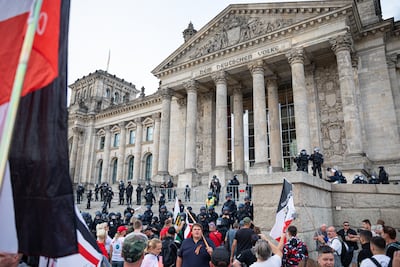Once seen as harmless oddballs, the right-wing conspiracy theorists who claim allegiance to the long-dead German Reich have evolved into a growing security concern, after two alleged terrorist cells were accused of plotting violence.
After a minor prince was held in December over an alleged armed coup plot, a retired lecturer nicknamed “terror granny” was one of five people charged on Monday with conspiring to kidnap a senior minister.
They are a far cry from the skinhead neo-Nazi hooligans who were once the face of the German far right, or the lonely, aggrieved young men who make obvious targets for radicalisation.
Experts told The National the two alleged plots were connected and came from a world of extremists and conspiracy theorists that grew in strength during the pandemic.
The so-called Reichsbuerger (Reich Citizens) refuse to recognise Germany’s post-war democracy and believe the 1871 to 1945 German Reich is still in existence. Some carry bogus passports or refuse to pay taxes.
“All of this, for a quite a few years, was fairly harmless,” said Hans-Jakob Schindler, a former German diplomat and a director at the Counter Extremism Project. "They got fines and they harassed local authorities, but they weren’t planning large-scale violence.
“It turned around the 2016-17 mark, when for the first time a Bavarian policeman was killed doing a raid at a Reichsbuerger’s home, who had of course not paid any taxes. From then onwards the scene became more violent.
“With Covid, this exploded. The right-wing extremists immediately realised that any type of severe societal crisis is something they can take advantage of.”

Far-right violence in Germany is, sadly, nothing new, and a string of racist attacks in recent years has rattled a country highly sensitive to the subject because of its traumatic 20th-century history.
But a new challenge with the Reichsbuerger movement is that some members have never been on the radar of security services, or hardly fit the usual profile.
“People expect young, disenfranchised, aggressive young men in certain areas to be involved in violent neo-Nazi hooligan gangs,” said Jakob Guhl, an extremism expert at the Institute for Strategic Dialogue.
“I think what they find more surprising is that these people are often from the mainstream of society, like doctors and lawyers and theologians and former soldiers and police officers. It’s a bit harder to explain why they’re so disaffected with the state and the political order.
“It’s not like, 'oh, this dude was sentenced for attacking someone four years ago, then he sprayed a swastika on the local mosque, and now here he is coming up in the plot'. This is not quite the audience.”
The plots described by prosecutors were so outlandish that it was tempting to laugh them off. The tweed-jacketed Prince Heinrich XIII allegedly wanted to lead a military government planned with typical German thoroughness, down to the level of health and justice ministries.
In the kidnap plot, the suspects wanted to impersonate Chancellor Olaf Scholz or President Frank-Walter Steinmeier to make a "false flag" announcement restoring the German Reich of 1871, it is claimed.
The alleged "terror granny", a 75-year-old professor of theology identified by prosecutors as Elisabeth R., is suspected of being the ideological mastermind behind that plot.
Prosecutors said she "pushed for a rapid implementation" of the plot and "repeatedly named specific dates" to move it forward. She was arrested in October.

Some politicians sought to play down the threat and suggested the raids in December, in which 25 people were arrested in one of the biggest anti-terrorist operations in German history, were overblown.
But some of the suspects had already acquired weapons, prosecutors say, and could have committed acts of violence even if they were never really going to overthrow the German state.
“Of course it would not have ‘worked’,” said Mr Schindler. "Would nobody have been harmed or be dead at the end of the process? Of course they would have been.
“You can be delusional, you can be crazy and you can still be extremely dangerous. Yes, it’s a bit amusing what they’ve done, but it’s dead serious. They were willing to kill people, they were willing to exert violence and that’s unacceptable.”
The fact that one suspect in the December case was a former far-right member of parliament, Birgit Malsack-Winkemann, led to concerns that a gang of extremists could have stormed the Bundestag.
Another worry was that the Reichsbuerger were allegedly recruiting in the police and military, which have long faced accusations of extremism in the ranks.
Intelligence services estimate that about 23,000 people are part of the Reichsbuerger scene, although it has no clear organisation or leadership.

The Covid protest scene brought it together with an eclectic mix of vaccine deniers, neo-Nazis, QAnon supporters, members of the Alternative for Germany (AfD) party, and other conspiracy theorists and splinter groups.
Health Minister Karl Lauterbach, who supported tough Covid restrictions, was the intended target of a kidnap plot over which five people were charged on Monday, prosecutors said.
Since the health crisis eased, the far right has sought to exploit public despair over the energy crisis and spread conspiracies about the war in Ukraine.
Mr Guhl said the spread of such conspiracies on social media, especially the messaging app Telegram, had connected people with the extreme fringe.
“You click through Telegram, starting in maybe an anti-vaccine group, and, whoosh, now you have the Reichsbuerger, now you’re with QAnon, now you’re with neo-Nazis,” he said.
“It just really brought a bunch of people together under one umbrella that probably otherwise would not have found each other.”


